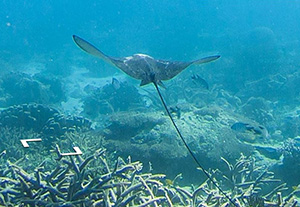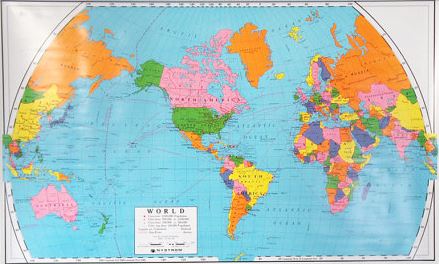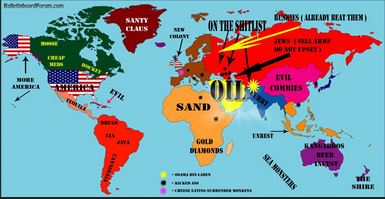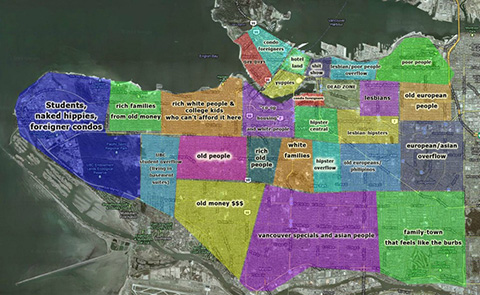may  2013
2013
So after 10+ years of intermittently searching for this damned commercial (nevermind the obvious if/then... so I could watch it once, snicker to myself and move on to the next thing) and just three months after posting my dismay on these very pages about its enduring, confounding elusiveness, I quite figuratively Stumble Upon it while searching for nothing else.
Perhaps I was inspired by the Clever Ads Billboard served up by the Stumblers... at least that's the most plausible suggestion my browser history from the other day had to suggest. So without further ado, dear readers, as Vimeo gave unto me I give to you... EGGO Family Breakfast (from KR on Vimeo), the commercial with the sock monkey and a weird stuffed thing called Neal. (Yes, it's still twistedly funny.)
(What the heck, I'll go ahead and excerpt the credits here. That's how much I like the darn thing.)
Agency: Leo Burnett
Creative Director: Kerry Reynolds/Patrick Doyle
Art Director: Ian Letts
Copywriter: Michael Gelfand
Agency Producer: Nancy Enderby
Director: Kuntz & Maguire
DP: Neil Shapiro
Editor: David Hicks
I can't stop playing this game (via Kottke) where you get dropped into a random spot in Google Earth Street View and have to guess where in the world you are. You can zoom in and out and use the directional arrows or the far-away teleporting dot thing and, depending on the location, go as far as you want in any direction before making a guess. The only time I found I couldn't was on what turned out to be a tiny island off the coast of Australia that probably wasn't much bigger than the two roads and a beach that I thoroughly explored before finding myself going in circles (I've since concluded that Australia is almost always the answer when I can't figure out where the hell I am).
 The amazing part about that island though, was that you could walk straight off the beach into the water, arrow down and swim quite a long way in any direction. I even came right up behind a stingray and reacted in much the same way I would in real life (screeching, wringing my hands and generally freaking out, then calling Mr. Pink over to "look, oh my god, look at this creepy thing — isn't that crazy?!").
The amazing part about that island though, was that you could walk straight off the beach into the water, arrow down and swim quite a long way in any direction. I even came right up behind a stingray and reacted in much the same way I would in real life (screeching, wringing my hands and generally freaking out, then calling Mr. Pink over to "look, oh my god, look at this creepy thing — isn't that crazy?!").
At which point Mr. Pink studied my screen for a few seconds and concluded that it was "much smaller" than the one he had encountered while scuba diving off the Grand Cayman Islands (in real life). He had been diving about 10 feet down looking at coral and little fish when a massive shadow suddenly loomed above, casting everything around him into darkness. He instinctively froze in place, heart pounding in his throat even before he spotted the source of the drop in temperature and visibility; a giant black manta ray with a six-foot wingspan that slowly glided by maybe halfway between him and the surface of the water. (When he tells the story, I picture the scene in Star Wars when the Death Star passes overhead blotting out the rest of the stars.)
 Anyway, the closer you guess to the actual location, the more points you get and I thought my first score was pretty awesome considering I learned geography at an American public school, long enough ago that "the Soviet Union" still took up most of Europe. The Eurasian continent was awkwardly split down the middle on our classroom map to give America central focus and Greenland was orange, not that it matters but it did provide the most memorable quote of the year from one Nina Malone, who raised her hand in the middle of a lesson about something else to ask in all seriousness, "why is Greenland called Greenland if it's orange on the map?"
Anyway, the closer you guess to the actual location, the more points you get and I thought my first score was pretty awesome considering I learned geography at an American public school, long enough ago that "the Soviet Union" still took up most of Europe. The Eurasian continent was awkwardly split down the middle on our classroom map to give America central focus and Greenland was orange, not that it matters but it did provide the most memorable quote of the year from one Nina Malone, who raised her hand in the middle of a lesson about something else to ask in all seriousness, "why is Greenland called Greenland if it's orange on the map?"
Which got me thinking about what I was actually taught in the only quasi-geography class I can remember taking, 7th grade Social Studies. We were living in Seattle at the time, which matters because the US education system varies drastically from state to state, although all but the reddest states settled the Evolution vs. Creationism debate long ago. (Even so, the fact that I just called it a "debate" is a telling detail, perhaps owing to the fact that they still manage to slip it into the conversation by way of the Scopes Monkey Trial story some time in high school. (Most classes in the North just watch Inherit the Wind and hold a brief class discussion before moving on to The Crucible, which explains why the story is generally misunderstood as a victory for the evolution side and which might also help answer the larger question, why do I know more about McCarthyism than world geography?) But I digress.
Just for fun, I looked up the requirements for 7th grade Social Studies in Washington State (unfortunately, the versions available online all seem to be contemporary, so we'll have to settle for marvelling at modern-day inadequacies rather than the ones that impacted my childhood). In addition to introducing students to the foundational "Washington State history from 1854 to the present day" curriculum, the list includes dozens of items with titles like "Golden Age of Salmon" and "Yakima's Love Affair with the Apple." A grossly disproportionate percentage of the syllabus is focused on the internment of the Japanese during WWII, which I distinctly remember reading about when I took the class in 1985. Not that we shouldn't learn about that, but its odd (and rather telling) that by contrast I learned more about the actual nation and history of Japan from watching Shogun than I ever did in school.
I thought about making a list of countries I learned about from Hollywood rather than the American school system, but quickly realized it would be faster to list the ones I didn't; Greece, Rome, Great Britain, France and the United States (and that last one is debatable). Of course, you don't notice anything when you're living in the US. There's no indication that anything is missing or incomplete about your understanding of the world. There's this sense, at least there was when I was in school and media coverage hasn't exactly convinced me that public schools have gotten better since then, that the rest of the world's history is just that — history. We learned almost nothing about the histories of other countries, except the ones we fought wars against, and even in the liberal oasis of private school, an America-centric bias is unavoidable. One thing is certain; if it wasn't for the fact that I happened to be born here, I never would have learned that Canada existed in school. When speaking with my American remote-worker colleagues I often have to bridge the uncomfortable silence that follows my telling them I live in Vancouver by adding, "...just north of Seattle."

Most of what I know about the rest of the world came after graduation, but what little I did learn in class took place in private schools, the first in Seattle (thanks to mandatory busing laws and, much as I hate to say it, white flight) and one in Virginia. The most memorable and useful educational experience of my life was without question a class called "Humanities" in 9th grade. It was basically a sweeping history of the Western world and covered such diverse topics as classical music, religious wars, medieval and Renaissance politics, colonialism, the art of the ancient world and how you can basically trace the development of the Western mind through depictions of the human form in sculpture. Even so, 50% of what I learned in high school was US History and we all know that to the US, the world looks like this:
Here's another fun game called Click that 'Hood, wherein you choose a city and have to identify each neighborhood as its name pops up onscreen. I guessed 20, er, 'hoods in Baltimore in under two minutes, but it took me almost nine minutes to identify the same number in Seattle where I lived three times longer and resided in at least a dozen different neighborhoods. I can't really blame myself for that either, though. Seattle has undergone a weird kind of rapid cell division since I lived there in the mid-90s, even in neighborhoods as clearly defined and unambiguous as Queen Anne Hill (if I'm feeling generous, there was always Upper and Lower Queen Anne but that made sense both geographically and socially, with the border being clearly defined at the bottom of the steep hill running straight up the south side which neatly divided one from the other). Now the "upper" hill seems to have factioned into three separate 'hoods, and all over the city you see "neighborhoods" consisting of a single street.
I gave up on the Vancouver map after repeatedly clicking one neighborhood I was sure was Strathcona to no avail, and was forced to conclude that the app was broken. But then, I live downtown ("yuppies" on the map below) and if I have to cross a bridge to get there, I probably don't know about it.
Speaking of what I don't know... I'll never forget the time I was eating lunch with a couple of friends, one of whom is from Wales and the other, Columbia. Our conversations usually involve politics and frequently American ignorance in general, but this time we were talking about an amazing documentary I had seen about two former mayors of Bogota, where my friend is from. I made an offhand comment about how I learned more about his country from one hour on YouTube than in all my years of school. It wasn't the first time the subject of what we learn or don't learn about the rest of the world had come up, and I had always assumed this deficit was common knowledge but the look on my friend's face — somewhere between indulgence and disgust — told me we were about to enter uncharted territory, conversation-wise.
He began telling us a story, his voice quiet and his demeanor calm as he explained what it was like when he first moved to Canada. Despite the fact that his previous experience was working on Bogota's version of Wall Street, the only place that would hire him was Starbucks. He smiled patiently as I got a few comments out of my system along the lines of Colombians and coffee and whatever, as my friend from Wales watched with what I could only hope was pity. At Starbucks, he was able to practice his English and gain experience working with all kinds and classes of people, but what quickly became apparent was something for which all his years of education hadn't prepared him.
In Columbia, he went to public schools and learned about the rest of the world; he learned English as well as Spanish and attended a highly respected university where he excelled in Economics and eventually graduated to work in the banking sector, near the top of Columbia's socio-economic ladder. There, students learn all about the United States, in a more or less favorable light depending on the teacher, and the goal is to attain the highest level of education possible so that one day you might be able to move to the US or Canada so you can actually make a lot of money at whatever it is you do. This, despite the fact that they are taught, in the US, Columbia is viewed as a third world country. I couldn't help noticing my friend from Wales had grown deathly silent in the corner, averting his eyes as the storyteller's tone grew more intense.
Here, at Starbucks, he met people from all over the world and, being an extremely extroverted and charming person and wanting to gain an understanding of the people in his new land, he spoke at great length to as many of them as time would allow. He quickly realized that Canadians knew very little of Columbia and Americans even less, to such an extreme that you could boil all their "knowledge" down to two words: coffee and cocaine (and that was among those who understood that Columbia was distinct from Mexico). He stared at me intently as he described his amazement and confusion at the time. "How is it possible," he asked. "That this is the great world Superpower? That this is the nation that calls my country the third world? How is it possible?" It was one of the few times I've been rendered speechless. I didn't know what to say then and I still don't today.

